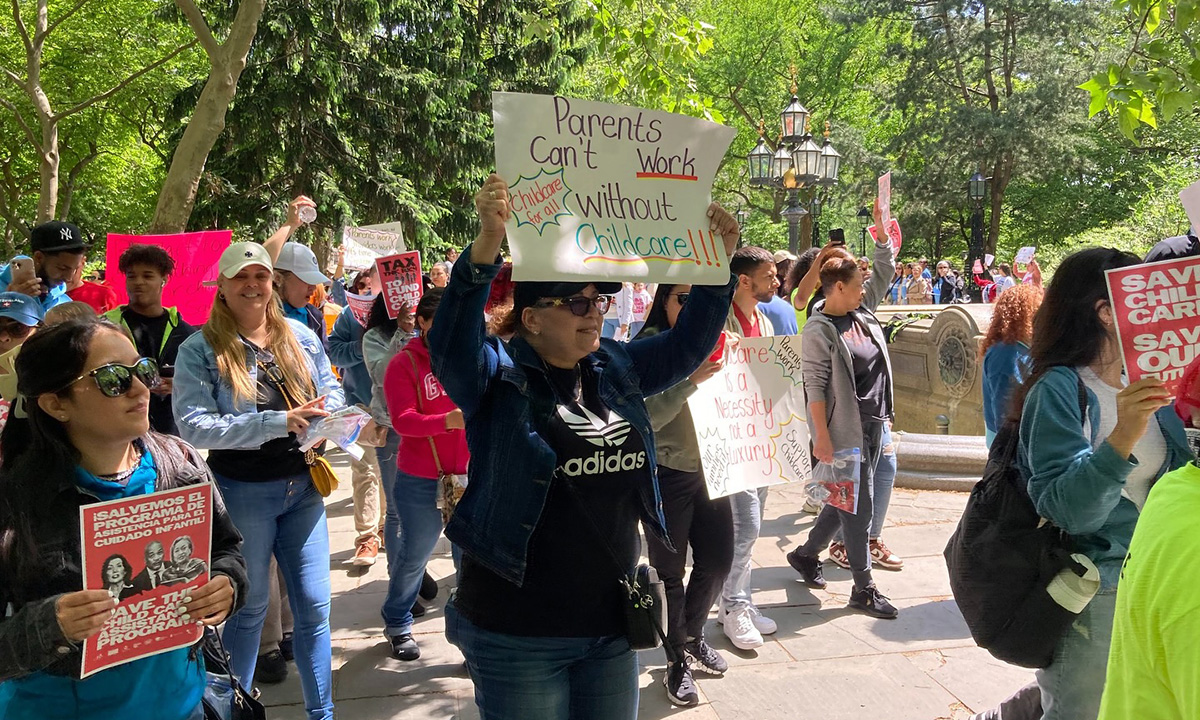On Monday, child care providers across the country participated in the fourth annual Day Without Child Care, closing their doors and gathering to demand a better child care system with more public dollars. In Wisconsin, some providers may remain closed for quite a while longer, according to Corrine Hendrickson, owner of a family child care program in Wisconsin, and one of the organizers of a prolonged protest — dubbed “State Without Child Care” — which intends to push back against the state legislature’s cuts to essential child care funding.
While direct actions — a form of activism that uses strikes or public demonstrations — by child care providers remain relatively rare in the U.S., it may be an increasingly important arrow in the quiver when fighting for the system children, parents and providers need and deserve.
At issue in Wisconsin is the fate of the state’s child care stabilization fund, known as Child Care Counts. Wisconsin is one of six states that doesn’t fund child care, relying instead entirely on inadequate federal funding. That temporarily changed during the pandemic, when providers began receiving regular payments through Child Care Counts that allowed them to maintain operations and kept parent fees from spiking. With these pandemic funds drying up, Gov. Tony Evers proposed $442 million over two years to continue the fund, but last week the Republican-controlled joint finance committee voted to zero out the child care money.
If this funding ends, there will be massive consequences for children, families and providers, which is one reason providers are engaging in such an unprecedented action. As the Milwaukee Journal-Sentinel reported, “A quarter of child care providers are more likely to close without further funding from Child Care Counts, and those that remain could be forced to raise their rates, according to a survey released April 10 by the Wisconsin Department of Children and Families.” This does not appear to be hyperbolic: funding reductions to Child Care Counts over the past few years have already caused providers to increase fees and to have more difficulty hiring qualified staff.
Providers have seemingly had enough. Hendrickson stated in a press release that, “While politicians negotiate over our funding and our lives, Wisconsin working families are once again left without. We’ve done everything we were told to do. We called. We showed up. We shared our stories. And still, lawmakers voted to cut child care from the budget. No plan. No replacement. No respect. We’ve had enough and we are drawing the line.” Providers across the state began protest actions in Madison on Tuesday, May 13, and according to Hendrickson, some will remain closed until the legislature guarantees they’ll restore the child care funding.
Single day child care protests are increasingly common. These have been seen in Australia and Ireland, and they have proven useful at garnering media attention — in fact, the 2020 Irish protest is credited with making child care a major campaign issue that year. These have also occurred regionally in the U.S.; for example, in Connecticut in 2022, providers organized a “Morning Without Child Care,” which became a landmark event that sparked other communities to follow suit via the now national Day Without Child Care.
The Wisconsin protest sets itself apart from these one-day actions though, in that the intention is sustaining activism until the state legislature meets a specific demand.
Perhaps the most notable modern example of a sustained child care work stoppage comes from Germany. In 2015, German child care staff across the country went on strike for four weeks to protest their low wages, marking one of the nation’s largest post-reunification labor actions and making international headlines. (The strike ended with a modest salary increase.) Similarly, in 2004, Scotland saw a strike of 5,000 child care educators that dragged on, in some localities, for more than three months.
One structural element that has made direct child care actions in the U.S. less common than in other nations is the fact that there is less government involvement to begin with. Both German and Scottish child care workers are largely hired by — and have their wages set by — municipalities, and most workers belong to a labor union. In the highly privatized and fragmented American system, there is little unionization and the divisions between employers and employees can be fuzzier; in fact, in many cases it is the owners of U.S. child care programs that are protesting. However, both Connecticut and now Wisconsin have been able to tie their demands to state legislative action, with the presence or lack of state funds for child care acting as a sort of stand-in for collective bargaining.
That said, the Wisconsin providers face challenges ahead. While the movement has received support from the community organizing group Community Change, the providers are not unionized. There is no standing strike fund, and for programs operating on thin margins, every day the doors are closed poses a significant loss of revenue. And of course, the participants would much rather be providing care and learning to the children in their programs. Participating in sustained closures is emotionally fraught. For early educators, it’s difficult to deprive families of a vital service they rely on. For families who will feel the impact, it’s expected that reactions will vary, but looking at Connecticut as an example, parents made it clear that given the choice between a temporary stoppage and permanent closure, reduced quality, or unaffordable fee hikes, they will generally stand alongside their child care providers.
Child care providers in the U.S. have long advocated passionately for more support, but have rarely engaged in prolonged protests. In Wisconsin, we’re about to find out whether sustained activism is a tool that can sway policymakers.




